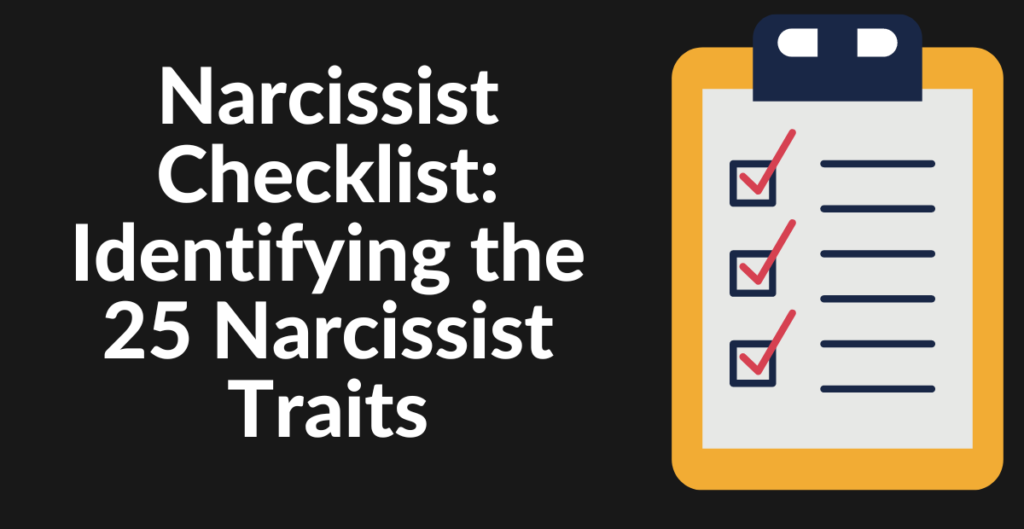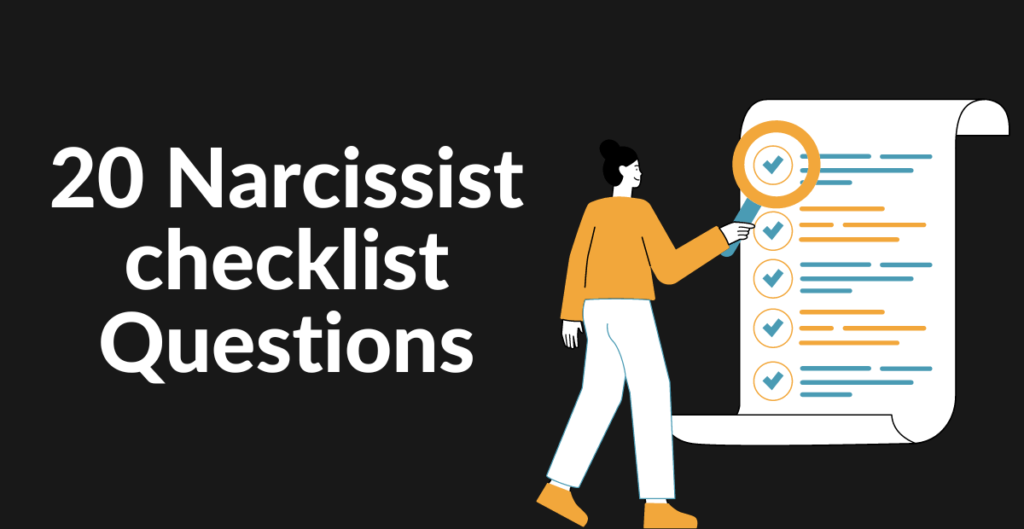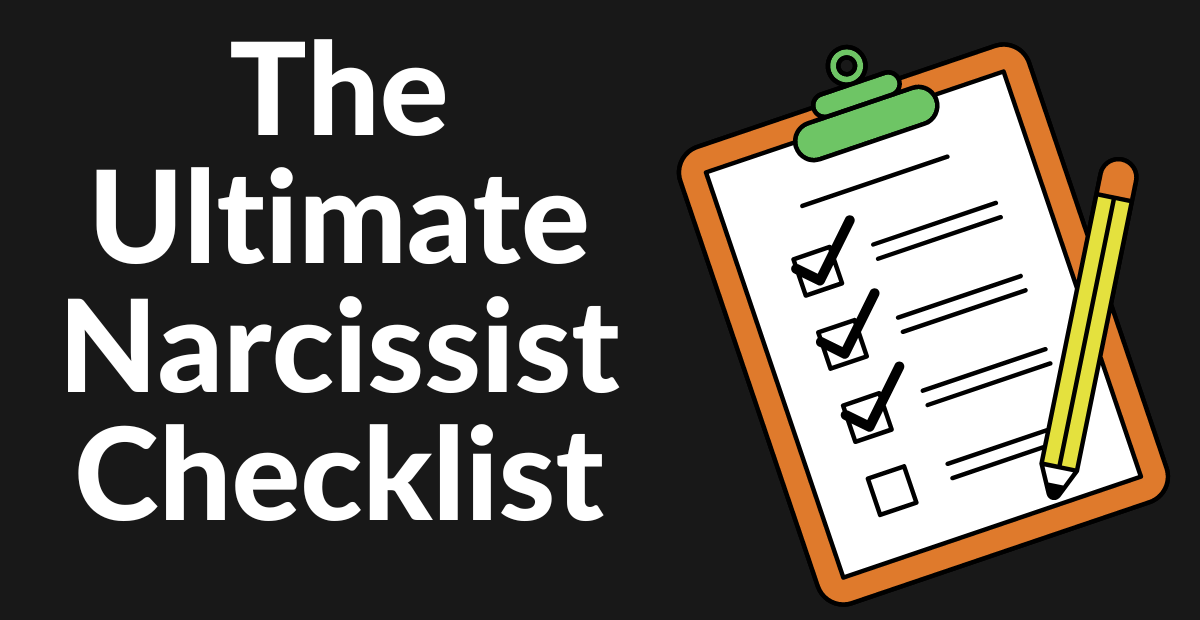In today’s world, it’s essential to be aware of the different personalities we encounter. One such personality type that often causes emotional turmoil is the narcissist. Dealing with a narcissistic individual can be challenging and draining, which is why it’s crucial to identify their traits early on. This article will serve as a comprehensive narcissist checklist, equipping you with the knowledge to recognize and cope with narcissistic behavior effectively. We will also include 20 Narcissist checklist questions for you.
What is a Narcissist?
Before diving into the narcissist checklist, let’s define what a narcissist is. A narcissist is an individual who possesses an excessive sense of self-importance, a constant need for admiration, and a lack of empathy for others.
They often display manipulative and self-centered behaviors, making it difficult to maintain healthy relationships with them.
Narcissist Checklist: Identifying the 25 Narcissist Traits

To identify a narcissistic behavior, we compiled 25 items in Narcissist checklist;
1. Grandiose Sense of Self-Importance
Narcissists have an inflated ego and believe they are superior to others. They have an excessive need for praise, admiration, and recognition. They constantly seek validation and attention from those around them.
2. Lack of Empathy
Empathy is a crucial quality that narcissists lack. They struggle to understand and connect with the emotions and experiences of others. They are often dismissive of others’ feelings and needs, prioritizing their own desires above all else.
3. Manipulative Behavior
Narcissists are skilled manipulators. They use various tactics, such as gaslighting, guilt-tripping, and emotional blackmail, to control and dominate others. They exploit people’s vulnerabilities for their personal gain.
4. Sense of Entitlement
Narcissists believe they are entitled to special treatment and privileges. They expect others to cater to their needs and desires without question. They have little regard for the boundaries and rights of others.
5. Constant Need for Admiration
Narcissists crave admiration and praise. They seek constant validation and attention from others to boost their fragile self-esteem. They often surround themselves with people who will feed their ego.
6. Lack of Accountability
Narcissists rarely take responsibility for their actions. They deflect blame onto others and refuse to acknowledge their mistakes. They will go to great lengths to protect their image and avoid any form of criticism.
7. Exploitation of Others
Narcissists have no qualms about exploiting others for their own gain. They will use and manipulate people without remorse, taking advantage of their kindness, resources, and emotions.
8. Envy and Jealousy
Narcissists struggle with envy and jealousy when others receive attention or praise. They find it challenging to celebrate other people’s successes and may even try to undermine or diminish them.
9. Lack of Boundaries
Narcissists have difficulty respecting the boundaries of others. They may invade personal space, disregard privacy, and intrude on others’ lives without permission. Their sense of entitlement overrides any consideration for others’ needs.
10. Emotional Manipulation
Narcissists are masters of emotional manipulation. They know how to twist situations, guilt-trip others, and use emotional tactics to get what they want. They can be charming and persuasive when it serves their interests.
11. Attention-Seeking Behavior
Narcissists constantly crave attention and will go to great lengths to be the center of it. They often engage in dramatic behavior,seeking to elicit reactions from others. They may exaggerate stories, create conflicts, or engage in attention-seeking behaviors to ensure all eyes are on them.
12. Lack of Genuine Empathy
While narcissists may mimic empathy when it benefits them, their empathy is superficial and insincere. They struggle to genuinely understand or connect with the emotions of others. Their empathy is primarily used as a tool for manipulation.
13. Superiority Complex
Narcissists have an overwhelming belief in their own superiority. They consider themselves to be above others in intellect, talent, and achievements. They often belittle and demean those they perceive as inferior.
14. Lack of Genuine Relationships
Forming and maintaining authentic relationships is challenging for narcissists. They struggle to form deep emotional connections and often view others as mere extensions of themselves. Their relationships are primarily based on what others can provide them.
15. Lack of Self-Reflection
Narcissists have a limited capacity for self-reflection and introspection. They rarely question their own behaviors or consider how they may be impacting others. They are highly defensive when confronted with their flaws or mistakes.
16. Sense of Entitlement to Special Treatment
Narcissists believe they deserve special treatment and privileges due to their perceived superiority. They expect others to cater to their needs and desires without question or hesitation.
17. Difficulty Handling Criticism
Criticism is a threat to a narcissist’s fragile ego. They struggle to handle any form of criticism and may become defensive, aggressive, or dismissive when faced with it. They view criticism as a personal attack.
18. Lack of Accountability for Actions
Narcissists rarely take responsibility for their actions or apologize genuinely. They shift blame onto others, distort facts, or deny any wrongdoing. Accepting accountability threatens their carefully constructed self-image.
19. Need for Control
Narcissists have a strong desire for control over others. They seek to dominate and manipulate those around them to ensure their needs and desires are met. They struggle with relinquishing control or compromising.
20. Fragile Self-Esteem
Beneath their grandiose exterior, narcissists have fragile self-esteem. They rely on external validation and praise to feel worthy and valuable. Any criticism or perceived threat to their self-image can trigger feelings of insecurity and inadequacy.
21. Lack of Genuine Remorse
Narcissists rarely feel genuine remorse for their actions. They may offer shallow apologies or show remorse only when it benefits them. Their primary concern is protecting their own interests.
22. Constant Need for Validation
Validation is a constant need for narcissists. They rely on others’ praise, admiration, and attention to maintain their inflated sense of self-worth. Without external validation, they may experience feelings of emptiness and worthlessness.
23. Manipulation of Information
Narcissists manipulate information to suit their narrative and maintain control. They twist facts, distort reality, and selectively present information to shape others’ perceptions and opinions.
24. Lack of Authenticity
Authenticity is foreign to narcissists. They wear masks and adopt personas to project an image of superiority and success. Their true selves remain hidden, and they may change their behavior depending on the audience.
25. Intense Fear of Rejection
Despite their outward confidence, narcissists have an intense fear of rejection. They cannot handle criticism, rejection, or abandonment. This fear drives their need for constant validation and admiration.
20 Narcissist checklist Questions

We also compiled 20 questions to ask yourself in narcissist checklist, these questions will help you determine the answer if someone is narcissist or not:
- Does the person constantly seek attention and admiration from others?
- Do they have an exaggerated sense of self-importance?
- Do they lack empathy and show little regard for other people’s feelings?
- Do they manipulate and exploit others for personal gain?
- Are they excessively preoccupied with fantasies of success, power, or beauty?
- Do they have difficulty accepting criticism and often react defensively?
- Do they envy others and feel entitled to special treatment?
- Do they display a haughty and arrogant attitude towards others?
- Do they have a history of unstable or volatile relationships?
- Do they constantly need validation and praise from others?
- Do they engage in gaslighting or manipulating others’ perceptions of reality?
- Are they overly sensitive to criticism or perceived slights?
- Do they have a tendency to belittle or demean others?
- Do they exhibit a lack of remorse or guilt for their actions?
- Are they preoccupied with their appearance and image?
- Do they have a pattern of disregarding others’ boundaries?
- Do they have a history of exploiting or taking advantage of others financially?
- Do they struggle to maintain long-term friendships or relationships?
- Do they exhibit a sense of entitlement and expect special treatment?
- Do they frequently use others for their own personal gain without considering the impact on others?
These questions can help you assess and identify narcissistic traits in individuals, providing valuable insights into their behavior patterns and tendencies.
Remember that the presence of a few traits does not necessarily indicate narcissism, but a consistent pattern of these behaviors may suggest the presence of narcissistic traits.
Narcissist Checklist: Frequently Asked Questions (FAQs)
How can I protect myself from a narcissistic individual?
To protect yourself from a narcissistic individual, establish and enforce strongboundaries. Recognize your own self-worth and prioritize your well-being. Limit contact with the narcissist, seek support from trusted friends or professionals, and practice self-care to maintain your emotional and mental health.
Can a narcissist change their behavior?
While change is possible for everyone, it is highly unlikely for a narcissist to change their fundamental traits and behaviors. Narcissism is deeply ingrained and often resistant to transformation. It is essential to focus on your own well-being rather than expecting the narcissist to change.
How should I respond to a narcissist’s manipulative tactics?
When dealing with a narcissist’s manipulative tactics, it is crucial to stay calm and composed. Avoid engaging in arguments or trying to reason with them. Instead, set clear boundaries, assert your needs, and detach emotionally from their attempts to manipulate you.
Can narcissistic behavior be passed down through generations?
While there may be a genetic component to narcissism, it is primarily shaped by environmental factors and upbringing. Narcissistic behavior can be learned or modeled from parents or caregivers who exhibit narcissistic traits. However, not all children of narcissistic parents develop narcissistic traits themselves.
Last Words on Narcissist checklist
Identifying and dealing with narcissistic individuals is crucial for maintaining healthy relationships and protecting your well-being. This narcissist checklist has provided insights into the common traits and behaviors exhibited by narcissists.
By recognizing these signs early on, you can make informed decisions and establish boundaries to protect yourself. Remember, it’s important to prioritize your own emotional health when dealing with narcissistic individuals.
